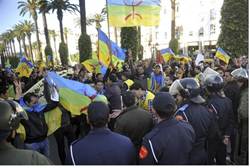Sam Pressprich
March 10, 2013
The Moroccan monarchy
was able to remain in power without conflict after the Arab spring. The 2011 constitutional reforms may have been
one of the biggest reasons for this. The
2011 reforms, took many powers from the monarchy, including giving the power of
dissolution of parliament to an elected prime minister. However, there has been continued discontent
and demand for social and political change within the country as Moroccans
aren’t seeing the much after the immediate effects of 2011.
Although
there was an increase in the voter turnout as a result of the 2011 reforms, 37%
in 2007 to 45% in the 2011 elections, much of the countries’ population is
still not involved in the voting process[i]. The reforms of 2011 did much to quell the
violence, but protests continue in reaction to the slow pace of reforms. Protests in January wounded dozens of police
officers and ten protesters ended up in jail.
More than 60 were wounded December 28 and 29 in Marrakesh.[ii]
Police stand guard at protest in Rabat, Reuters
Although Morocco and neighboring Europe have
been in recent talks on a comprehensive free-trade agreement, relations with
the constitutional monarchy have been uneasy as well. On March 6, 2013, a European Parliament
delegation en route to the disputed territory of Western Sahara was refused
entry at the airport in Casablanca.
The approximation and
location of Morocco make the stability of its’ government of key importance to
the security of Europe. The diffusion
effects of the Arab Spring are still being seen in the protests which play out
today. A lack of change within the
regime to address the demands of the protestors will lead to increased tensions
between the Moroccan people and ties with Europe and the west.

I'm interested to see if change will occur in Morocco as a result of local insatiability and how this could translate to the disputed area of Western Sahara. This region has long disputed over this area of land and I'm intrigued to see how shakiness in Morocco and the surrounding countries' states will impact the people there.
ReplyDeleteI found this article interesting because I never actually considered Morocco to be part of the Arab Spring. I never heard of of any large uprisings or mass revolts, which to me shows that (from the information presented) though protest in Morocco occurred and there small increase in voting happened after reforms is that the majority of the populous is not demanding a regime change.
ReplyDeleteAnd anyone that does revolt the government is not afraid of discouraging with violence. So from class discussions, I would argue that not enough of the populous is willing to risk harm to change the government as well as a Morocco has a state capacity that does not seem the people could influence.
If I can allow myself to answer you, Kristina, on the topic of Sahara, I must say that it is far from being a topic related to the current protests in Morocco. As a matter of fact, the subject of Sahara in Morocco has always been a tremendously important one for obvious reasons, but a subject handled with a high level of secrecy from the government for less obvious reasons. Thus, throughout the years it is honest to say that Western Sahara remains a strong grievance of the Moroccan people but one that is not thought of daily let's say. My point is that this 'shakiness' in Morocco will not interfere with the mechanisms of conflict resolution already at work in the Sahara.
ReplyDelete